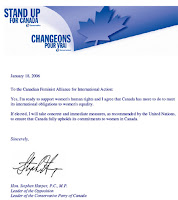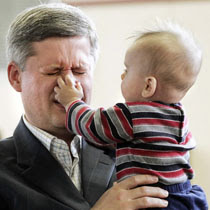Submitted by hillarybain on Mon, 2007-01-15 10:58.
Feminist organizations nationwide are protesting the latest in a series of attacks on Status of Women Canada (SWC).
by Anna Carastathis
Marching on Ottawa Hill on December 10 to protest Harper's cuts to SWC. Photo: CUPEDavid-James Fernandes
On October 11, the Dominion reported that the Conservative government imposed a 40 per cent reduction of SWC's operating budget over two years, as well as new restrictions on the agency's grant program. In what might be described as an effort to de-politicize SWC, the government has forbidden the agency from funding groups that undertake advocacy or lobbying for women's rights. It has also removed the word "equality" from the agency's mandate.
Following these cuts and restrictions, on November 28, Bev Oda, the minister responsible for SWC, announced the closure of 12 of 16 SWC regional offices, to take effect on March 31, 2007. Almost half of SWC's employees -- 61 of 131 -- will lose their jobs. The four remaining regional offices (in Edmonton, Montréal, Moncton and Ottawa) will be required to provide services to expanded -- critics say unmanageable -- jurisdictions. In the most extreme case, the Edmonton office will serve women and women's groups across British Columbia, Saskatchewan, Manitoba, the Northwest Territories and the Yukon, in addition to those based in Alberta. This is an area of over 4.7 million square kilometres, constituting almost half -- 47 per cent -- of the total territory occupied by Canada. Despite the foreseeable increased workload, there are no plans at present to hire additional personnel to staff the Edmonton office, according to a SWC official. The Moncton office will serve Atlantic Canada; the Montréal office will serve Québec and Nunavut; and the Ottawa office will serve Ontario and national feminist and women's organizations. Justifying this decision, Oda maintained that the regional office closures will help the SWC remain within its severely restricted operating budget, saving approximately $700,000 in rent and utility bills.
Implying that the SWC is a "special interest" agency, Oda told the CBC that "[we] don't need to separate the men from the women in this country." However, on January 18, 2006, during his campaign, Stephen Harper vowed, if elected, to "take concrete and immediate measures [...] to ensure that Canada fully upholds its commitments to women in Canada." Now, the Conservative government is claiming that downsizing SWC will actually better serve the goal of achieving women's equality. As quoted in the Ottawa Citizen, Oda suggested that running a separate agency devoted to researching and mobilizing to improve conditions facing women's issues actually "weakens the ability of the equality of women to be instilled throughout the government departments, agencies, and offices."
Demonstrations against the cuts, restrictions and office closures have been held across Canada. On December 10, over 1,000 demonstrators rallied in support of the SWC and women's equality in Ottawa, marking the 25th anniversary of Canada's ratification of the UN Convention on the Elimination of All Forms of Discrimination Against Women (CEDAW).
According to Joyce Arthur of the Abortion Rights Coalition of Canada, Oda's claim that the SWC "ghettoizes" the task of achieving women's equality "reveals a fundamental misunderstanding" of the agency's mandate. Arthur, who is working on the B.C. Campaign for Women's Equality and Human Rights in Canada, explains that the SWC was set up to "help women mount campaigns and do research on particular issues affecting women, so that they can then take this work and lobby the relevant government ministry or department to make changes that will benefit women. The point of SWC funding is to help ensure that [the] government examines [its] policies and legislation through a gender lens. The SWC [is] a conduit that allows women access to government in general and to lobby for women's equality at all levels."
Opposition MPs have joined feminist groups and labour unions in calling for Oda's resignation, who is responsible for what Liberal MP Maria Minna (Beaches--East York) calls "the single largest attack on women's services in the history of this country." At the same time, Shauna Paull cautions against "personalizing these cuts to SWC to [Oda]." Paull, a feminist organizer active in the B.C. Campaign, argues that the cuts, restrictions and office closures are part of a systematic, "ideological demolition of [women's] equality." Arthur agrees: "[The] government has effectively removed women's Charter right to equality, by removing the mechanisms for achieving it."
Arthur sees restricting the role of SWC to "service provision" (barring it from funding "political" groups, research or campaigns) as an effort to de-politicize gendered oppression. "It simply doesn't make sense to restrict SWC funding to provide services directly to women, since that does nothing to address the systemic inequality that causes the need for those services to begin with," she says. "For example, women's groups fighting against domestic abuse combine their efforts at both helping individual abused women at transition houses and lobbying the government on ways to address and reduce domestic abuse in general. The two activities cannot be separated." Barb Byers, executive Vice-President of the Canadian Labour Congress, quoted by CTV.ca, echoes this view: "It's not good enough for this government to say we'll give you more money for shelters but we won't let you question why women are there in the first place."
Feminist and women's organizations have not stood by silently as Harper's Conservatives "turn their backs on [...] women in Canada," as Arthur puts it. No sooner had the cuts been first an-nounced in mid-October, Pam Kapoor and Audra Williams, together with a network of feminist contributors, launched StatusReport.ca, a website serving as a centralized source of information and calls for action, which has reportedly received over 40,000 "hits" since its inception.
On November 13, an ad-hoc coalition of women's and feminist organizations, led by the Feminist Alliance for International Action (FAFIA), began the "One-Month Campaign for Women's Equality and Human Rights." In addition to the cuts and restrictions to SWC, the campaign opposed the cancellation of the Court Challenges Program; the government's refusal to adopt improved pay equity legislation; and the cancellation of a pan-Canadian childcare program, effecting cuts of $1.2 billion annually to provinces and territories for childcare services.
Demonstrations against the cuts, restrictions and office closures have been held across Canada. On December 10, over 1,000 demonstrators rallied in support of the SWC and women's equality in Ottawa, marking the 25th anniversary of Canada's ratification of the UN Convention on the Elimination of All Forms of Discrimination Against Women (CEDAW).
On this day, the National Association of Women and the Law presented a declaration, signed by 430 feminist and women's organizations and by thousands of individuals, calling on the Harper government to renew Canada's commitment to CEDAW, specifically "by improving the living conditions and respecting the human rights of Aboriginal women, effectively addressing violence against women and women’s poverty, improving maternity and parental benefits, funding civil legal aid, changing immigration laws to respect the rights of live-in caregivers and ensuring a more equitable participation of women in the political institutions."
Elsewhere, 300 people from throughout New Brunswick converged on Moncton for a rally, while in the Northwest Territories, an "old-fashioned bra-burning" was held in front of the federal building in Yellowknife. "Mourners" gathered at a "funeral for women's equality” in Winnipeg on December 8, and in Saskatoon, Iskwewuk E-wichiwitochik (Women Walking Together) held a discussion on the impact of the cuts on First Nations women's lives.













